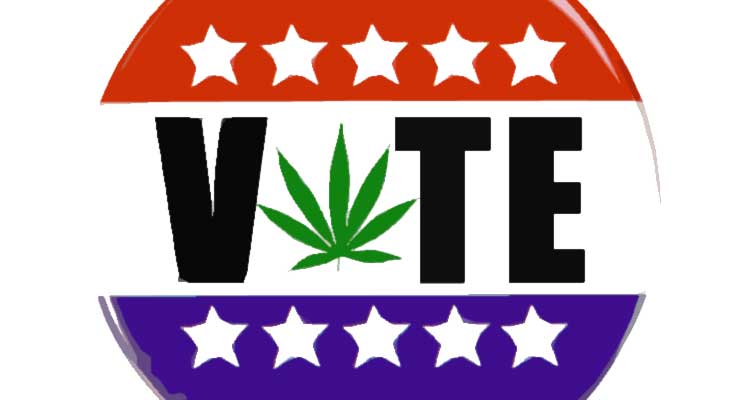
Shortly after a recent meeting with Kim Kardashian, one predicated around prison-reform, President Trump signaled his willingness to entertain the idea of curtailing federal-ban of marijuana. While that is certainly not a sentence that I ever thought I would write, it is one that is emblematic of the progress the United States has made in recent years regarding the prospect of nationwide marijuana-legalization. In the wake of the aforementioned meeting, I feel as if it’s appropriate to (attempt to) diminish the stigma surrounding the drug.
First and foremost, you need not be an avid pot-smoker in order to advocate for its legalization. Far too often are individuals favoring authorization for legal-usage disregarded as “pot-heads” or other flattering labels of the likes. This is not always the case; in fact, I can refer you to numerous people favoring legalization who have ostensibly never utilized the drug in their life. “If they don’t actively use marijuana, why would they want it legalized?,” some may ask.
There are a variety of answers to this question, the first being for economic-reasons. If the government were to legalize it, or at least force the decision of legalization to be made at a state-level by dropping the schedule 1 designation title, ending the federal-ban, free-enterprise will inevitably take advantage of it. An inherent feature of capitalism is to supply the demand, and there will be a considerable amount of demand.
A 2017 study shows that a shocking 23% of American adults admit to regularly utilizing marijuana, and that well-over half of adults have used it at least once. Now, imagine if marijuana was sold legally in the private-sector. The amount of jobs, and inextricably, tax-revenue that would accompany the legalization of pot would certainly net beneficial results for all. In fact, weed-sales from dispensaries in Colorado alone have yielded over $500 million in tax-revenue within a 3 year span (2014-2017.)
More impressively, a study from New Frontier projects that the immediate legalization of marijuana would yield over 1-million jobs and generate a whopping $132 billion in federal tax-revenue by 2025. Conflate this figure with the fact that 27% of the people claim they don’t use marijuana claim solely due to it being illegal, and you have a minimum (emphasis on minimum) of 86 million people willing to purchase marijuana.
Additionally, marijuana has been said to alleviate the complications of many ailments, both physical and mental; however, I will abstain from citing marijuana as a means of mitigating depression, anxiety, ADHD, or anything of the like, as these ailments are proven to be overdiagnosed. Realistically, it’s not all too difficult to pass oneself off as depressed or anxious simply to obtain medicinal-marijuana; I digress. There is, however, an abundant amount of evidence suggesting that weed helps patients subjected to cancer and seizures.
A study in Colorado (seemingly the epicenter for marijuana-related experimentation in the US) showed that 36% of a control group diagnosed with epilepsy showed a reduced amount of seizures, while another 2% of patients of the group proved to be absolved of seizures entirely. Similar results exist within the dynamic between marijuana and cancer. There are numerous cases of success stories relating to cancer patients utilizing marijuana, as a considerable amount of people sent their cancer to remission solely by substituting chemotherapy for marijuana entirely. In fact, there’s an entire website predicated around such stories.
There is robust evidence that supports the assertion that marijuana has far more use than sole recreational purpose. Speaking subjectively (as it’s hard not to, seeing as how my perception is skewed due to my being a libertarian,) pot-prohibition is simply another way for government to control the livelihood of should-be-autonomous adults who can make decisions for themselves without futile influence from big-brother. This is not heroin or cocaine; there have been literally zero deaths by way of marijuana-overdose in the history of man.
It’s due time we allow marijuana to be legalized, regulated primitively, and sold accordingly.
David Anderson says
Excellent article as usual Mr. Kot. I don’t always agree with you, I’m not so far into the libertarian dynamic as yourself but I can often find common ground in what you write.
The entire war on drugs has been a disaster on every metric and MOST of the horrors of drugs are due to prohibition, not the drugs themselves. (More on that in a coming article.)
When it comes to scheduling of MJ, however, the mechanics of federal legalization aren’t as simple as many people assume.
Two things – I believe if anything depression is UNDER-diagnosed in our society.
and 2)
If I may be so conceited as to quote my own article on the subject-
“Into this complicated matrix enter the agencies. For the future of marijuana in America, the president only has some authority over agencies such as the F.D.A. and D.E.A., (it is clearly within both their jurisdictions. President Obama recently noted this in an interview with Rolling Stone on the issue of moving marijuana out of the Schedule 1 Status: “Typically how these classifications are changed are not done by presidential edict but are done either legislatively or through the DEA. As you might imagine, the DEA, whose job it is historically to enforce drug laws, is not always going to be on the cutting edge about these issues.”
Congress can decriminalize pot if so inclined, with presidential approval (or veto?). There is no such precedent for this in Congress, however ……”
from –
https://themoderatevoice.com/trump-on-dope-legal-and-psychological-thoughts-on-the-future-of-marijuana-laws/
Keep up the good writing,
David, NYC